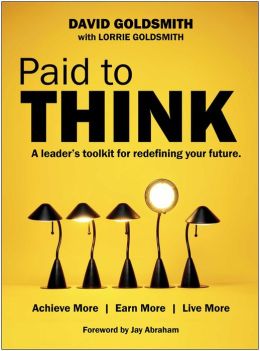Paid To Think – Book Review
Posted by Mitch Mitchell on Mar 22, 2013
This is something different for an interesting reason. I'm reviewing a book by someone I know and respect greatly that I came across in Barnes & Noble, not knowing that he'd even written it. It's a huge book in more ways than one. It's dense, over 600 pages of information, and oversized, to the point where I actually bought a second copy, electronic, so I could read it on my Nook. But it was worth it.
 |
Paid To Think by David Goldsmith is his first book, and he's taken all the lessons he's learned as a business consultant and coach for major companies around the world and put a lot of it into this book. It's based on what he calls Enterprise Thinking, which he calls "a holistic approach to leadership and management."
In essence, Enterprise Thinking has 4 major groups or cornerstones which are: Strategizing, Learning, Performing and Forecasting, and leads to 12 specific types of activities, each one a major category in the book. I'm not giving it all away, but as an example we can look at strategizing and see chapters like Creating Strategy, Transforming With Projects, and Managing Your Priorities.
The thing about this book is that even though each chapter is the next step in the process, each chapter is also a standalone process, so much so that something David's done with this book is set it up so that each chapter can actually be purchased independently.
Enough of that; what did I think of the book? I liked it, though I have to admit that this is the type of book that's not just general, easy reading. So much so that I know I'll have to read it again to reinforce some of his thoughts and beliefs, whether I agree with them or not, and there were a couple of things where I had minor disagreements. When I met with David he told me that he's talked to other people who have read the book and many of them have said that they've read the book multiple times and actually use it as a resource for when they need a boost of some kind. That's not usually my style but then how many books on management are this big?
Where did I disagree? We have a different thought on how we view employees. In his own words he states that leaders should rethink the concept that employees are the most important part of an organization, that instead systems are more important because a good system is dependent upon good people but gives organizations more opportunities to find good people.
I've always been of the opinion that when companies don't view employees as the most important asset that they tend to take them for granted and rarely verify that their systems and their employees can be symbiotic with the overall goals of the organization. If you don't treat employees well, they can and will sabotage your operation. At the very lest you better try to make them feel like they're the most important asset in the company.
Other than that the business concepts in this book are solid. David knows a lot of famous people and he's not afraid to name drop. He also tells a lot of stories, and in a book this large I believe stories are needed to help people understand the concepts better. By the way, he's also a teacher at New York University and has been for the last 10 years, and you can tell that the way the book progresses has an academic feel. But it doesn't read like a textbook, which is a good thing.
Having a step by step process to help one figure out the direction of a company, implement processes, train people and plan a host of other things is never a bad thing. This book offers direction in a fairly detailed way. It is and isn't easy to implement; like most systems, some people will get it immediately while others will struggle with it. But it's comprehensive; if you can follow it you'll leave no stones unturned.
Yes, I recommend this book wholeheartedly but I will warn you one more time that this book is huge. Buy the real book in the store if you're either going to try to track him down for an autograph, like I did, or if you're someone who will mark up a book with highlighters or likes to write a lot of notes in your book. I keep my books quite pristinely thus, since I knew I wasn't going to write in the book, I found the electronic version worked great since it was easier to carry around and read in the big comfortable chair in my living room.
Either way, you have to check out this book, or take a look on your favorite book selling website (I'm a B&N guy) and purchase a chapter you think might be more pertinent for your needs. This is good stuff; you'll learn a lot.

